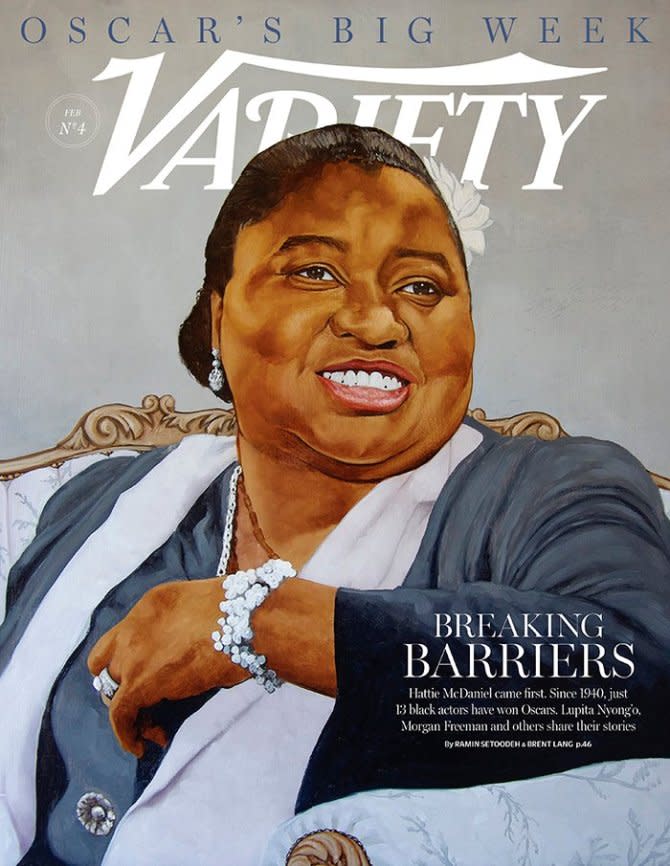Hattie McDaniel: Hollywood’s Beloved, Controversial Trailblazer

June 10 would have been the birthday of Hattie McDaniel, the memorable Oscar winner for “Gone With the Wind” and a Hollywood trailblazer who is remembered with both affection and a little ambivalence.
She was born in Wichita, Kans., in 1895, the youngest of 13 children of two former slaves. Five years later, the family moved to Colorado, where she made her debut on the relatively new medium of radio. She is credited as being the first black woman to sing on the radio, thanks to her gig at age 17 in Denver. She sometimes performed as “Hi-Hat Hattie” and continued singing and doing comedy on radio, in nightclubs and in vaudeville.
She came to Hollywood while in her 30s and appeared uncredited in several works. But the studios took notice with her small but fun role in 1933’s “I’m No Angel,” playing one of Mae West’s maids.
McDaniel was first mentioned in Variety on July 11, 1936 (using common terminology of the time): “Hattie McDaniel, colored comedienne, has been given a two-picture contract at Metro. She goes into ‘The Devil is a Sissy’ and ‘Libeled Lady.’ William Meiklejohn set the deal.” That was the entire story. (Meiklejohn was her talent agent who later represented such stars as Lucille Ball, Ronald Reagan and Nat King Cole.)
Hattie McDaniel graced the cover of Variety‘s annual pre-Oscars issue in 2016. |
She won her supporting actress Oscar for “GWTW” on Feb. 29, 1940. The following day, Variety ran several front-page stories about the Academy Awards, and she was the only star to be singled out for a story. It said, “Miss McDaniel was given a great ovation when she entered the banquet hall, bedecked in orchids and flashing a smiling recognition of the tribute. Not only was she the first of her race to receive an award, but she also was the first Negro ever to sit at an Academy banquet…
“The award marks the top of a film career begun in Hollywood by Miss McDaniel in 1931.” The report continued that she had been averaging a dozen film appearances a year, including such hits as “Blonde Venus,” “The Little Colonel,” “Alice Adams,” “Show Boat” and “Nothing Sacred.”
McDaniel’s career, and her Oscar win, marked a Hollywood breakthrough, but nearly every positive move was accompanied by a sobering footnote. Though she played a key role in one of the biggest Hollywood movies ever, she was not allowed to attend the Atlanta world premiere of “Gone With the Wind.” (However, she did attend the Los Angeles premiere.)
As the Variety story indicated, she was the first black actor nominated for an Oscar, and the first to attend the Academy Awards; however, the story omitted the detail that McDaniel and her escort were relegated to a separate table.
Though Mammy is a beloved character and the most sensible person in “GWTW,” the movie sidesteps some harsh realities of the era — Mammy and Big Sam (Everett Brown) seem more like friends of the O’Hara family than slaves. And some observers have lamented the fact that McDaniel, like so many black Oscar winners, was saluted for subservient roles.
That’s true, but the Oscars are just a reflection of Hollywood. In the studio era, there weren’t many roles in mainstream films for well educated, self-sufficient characters who were not white. And when it happened, white actors often played those roles, such as Asians (“The Good Earth,” “The Bitter Tea of General Yen”) and Latinos (“Viva Villa!” “Juarez”). It’s a tradition that, incredibly, persists in the 21st century.
McDaniel’s Oscar win was a significant moment, but it didn’t exactly open the floodgates. Oscars reflected the Hollywood era, with no diversity, other than McDaniel, until Puerto Rico-born Jose Ferrer in 1950 and Mexico-born Anthony Quinn in 1952. Lupita Nyong’o became the 15th black person to win an acting Oscar (for the 2013’s “12 Years a Slave”), and 12 of them have been in the past 25 years. So there is progress, though many feel it’s not fast enough.
After the Oscar win, McDaniel continued working with success; however, some criticized her for accepting roles as maids and servants. She quietly stated that she was happy to be working as an actress. In general, she avoided politics, but during WWII, she was chairwoman of the Hollywood Victory Committee’s “Negro Division.” She died in 1952, age 57, of breast cancer.
Hattie McDaniel stands as an icon: Though some are critical of her roles, nobody disputes her great acting. When she won, she said tearfully, “Academy of Motion Picture Arts and Sciences, fellow members of the motion picture industry and honored guests: This is one of the happiest moments of my life, and I want to thank each one of you who had a part in selecting me for one of their awards, for your kindness. It has made me feel very, very humble; and I shall always hold it as a beacon for anything that I may be able to do in the future. I sincerely hope I shall always be a credit to my race and to the motion picture industry. My heart is too full to tell you just how I feel, and may I say thank you and God bless you.”
Visit VarietyUltimate.com for contents of every issue since 1906.
Related stories
'The Shining' Anniversary: Stanley Kubrick & His Mysterious Classic
Cher Turns 70, Still a 'Hot Artist' After 50-Plus Years
Queen Elizabeth's 90th Birthday: Still a Star Long After Coronation Fanfare
Get more from Variety and Variety411: Follow us on Twitter, Facebook, Newsletter

